QuestionI own 3 cats- Ava, a 5 1/2 year old long-haired orange and white fixed female, Martini an 1 1/2 yr old fixed short-haired orange tabby female and Oscar, a 2 or 3 yr old fixed long-haired black male. The one I am having issue with is Ava- in the past couple of months, she has been pooping in places where she shouldn't be. She isn't a indoor cat, I would almost label her as both indoor and outdoor- she will stay indoors for the most part in the colder months, but in the warmer months, she spends a great deal of time outside. She is litter-trained but has been pooping more frequently in the kitchen (most of the time) and by our pantry door (once so far)
I have owned Ava since she was a young kitten, when she was found by a person who worked with a friend of my father's. She was first a family pet, when I lived with my parents and sisters and I have since taken on the whole lot when I moved out on my own back in January. She is a lovely cat, I have never had any major behavioural problems with her and she has been a picture of health since we "adopted" all those years ago. It is only in the past couple of months that we have been having our problem.
Like I mentioned earlier, in January my sister and I moved into an apartment of our own when our parents decided that it was needed to downsize from our house to an apartment of their own. At that time, we had the 3 cats and a large dog- the dog has since been living with my parents. I have felt very attached to all three cats and wanted to keep them, though there was a brief time where we tried to see if she would enjoy living with my parents and the dog. It didn't work and for a brief time we had no problems with her. Around April, my boyfriend moved in and about a month after that my sister left.
At first she didn't like my boyfriend, which could be a reason why she is doing what she is doing. She would growl at him and avoid him while the other cats didn't have a problem. There was a time when she spent some time sleeping under the day bed that has been set up in our living room- we couldn't lift her, she would growl and she seemed to spend all her time sleeping. I didn't know what was wrong and she seemed to come out of it fine, at least with no real lasting affects. Most recently she and the male were missing for about 4 days, after a severe rainstorm that we had over the Canada Day weekend. They returned, the male is fine for the ordeal while we seem to be cleaning up after Ava a little more often. Whether that had anything to do with it, I don't know. There was also an incident shortly after my boyfriend moved in where she and the other cats were chased around our balcony by a group of teens (which is the second floor, not far from the ground- her and the orange tabby have no problem jumping up or down from it to get in and out of the house).
Both my boyfriend and I are at our wits end with this- more so with my boyfriend, since he is the one to clean up Ava's 'gifts' as I am 5 months pregnant and don't want to handle the mess myself. I love my cat, obviously but with a child on the way, I cannot have a cat that will think it's ok to poop where she shouldn't. I have come to the decision that I may have to send her to animal shelter, so that someone else can take care of her and possibly give her a better home than I can.
Maybe you have some insight as to possibly why she is doing this. I do plan to take her to the vet, since I also know it could be something physical that she can't help. But I would like to cross behaviour as the reason- is it that she angry with us or doing it out of frustration (some of the times seemed to occur when the food dish was empty- the most recent time, though, did not)
Thanks for any help you can give me- it is much appreaciated in such a frustrating time.
-- Kayte MacMaster and Chuck Radford
AnswerKayte & Chuck,
I would like to start off by mentioning the points that I believe are most important in this situation. I can certainly relate to your frustration with this issue. I would like to offer a few insights and tips that will help you to get Ava's behavior back on track. Frustration and anger isn't going to make the changes that you would like to see. I would recommend that you try to be as calm and level headed as possible as this will certainly help to increase your chances of helping Ava to change. Ava truly doesn't understand why you are frustrated at this point and if she senses that the negative feelings are directed her way it's possible that she may become more insecure and upset which could make the problem worse. It is a possibility that this behavior is a result of a combination of different aggravating factors. These litter box avoidance issues can be successfully treated more often than most people realize. I am going to make a number of different recommendations that will allow you to understand the reasons behind Ava's unpleasant new behavior. I am aiming to give you a crash course in kitty psychology and behavior modification.
Your vet can be a valuable resource and provide strategies to work at the best way to correct this behavior. It's not a bad idea to speak to your vet about the possibility of a referral to an animal behaviorist. Some behaviorists will come to your home so that they can get a sense of the cat's temperament and the environment that she is living in as well as getting a complete medical and behavioral history from you. In all cases involving litter box issues my first recommendation is that you take the offending kitty to the vet and have him/her perform a thorough physical exam as well as blood and urine testing to completely rule out the possibility that your cat is ill and requires medical treatment. Sometimes it can be hard to tell who is responsible for accidents found outside of the litter box so I would recommend that you speak to your vet about ways to verify who the culprit is. Any number of health issues can cause cats to go outside the box.
It is important to know that regular household cleaners don't completely remove the smells associated with organic compounds which means that your cat can pick up on these odors even after several cleanings. I recommend the use of an enzymatic cleaner to clean any areas that Ava has had a bowel movement. This is an important step because enzymatic cleaners use beneficial bacteria to destroy the components of organic materials that are responsible for creating an unpleasant odor and stains. Using an enzymatic cleaner to remove odors and stains caused by urine, feces or vomit will sometimes be enough to stop undesirable behaviors if Ava is returning to the same area to defecate each time simply because she can smell previous mistakes. I have recently found a very effective enzymatic cleaner that has so far proven safe on fabrics and upholstery in my home.
Enzymatic cleaners aren't just for pet messes, they clean organic substances and they can be good to have in your home when your baby is born. Enzymatic cleaners use beneficial bacteria to digest organic materials and they aren't as toxic as the vast majority of household cleaners. These cleaners are generally well priced, widely available and useful for a number of applications without harsh chemicals. My preferred enzymatic cleaner is a product called Petzyme. You can probably find Petzyme in most pet supply stores. What I like about this product is that the manufacturer provides instructions for using the product as a pre-wash treatment or adding some to the washing machine in the event that this becomes necessary.
It's important to go over litter box basics when your cat is not using the litter box/going outside (whatever was the norm prior to this issue developing). In multiple cat households I recommend that there be one litter box per cat plus one at a bare minimum. In cases like this where your kitty isn't going to the toilet in acceptable places it's not a bad idea to have one litter box per cat plus one per level of your home if you have a larger home. Litter boxes shouldn't be too close together just in case there is an issue with another cat bullying or upsetting your litter box delinquent. I normally recommend that cat owners use an unscented clumping kitty litter. In my experience it doesn't really matter whether the litter is made from clay, corn, wheat or any other substance. The reason that I recommend the use of unscented kitty litters is because just like people, some cats are sensitive to dyes, perfumes and other chemicals. On the same note I wouldn't recommend that air fresheners or other scented products be used in or around litter boxes. It is important to clean litter trays a minimum of once a day so that your kitty litter doesn't smell. Cats are very clean by nature and they don't want to step in urine or feces while using the toilet (human equivalent = dirty, smelly gas station bathroom with no toilet paper). Given that you describe Ava as an indoor/outdoor cat there is a distinct possibility that she is being bullied by bigger stronger cats in her territory which can sometimes account for changes like this.
Unfortunately litter box issues are a common reason that cats and kittens are surrendered to animal shelters and euthanised by private veterinarians each year. Many people believe that if a cat develops house soiling behaviors there is no way to correct them. This is a misconception that leads to countless cats being euthanised because their pet parents aren't made aware of treatments that could potentially stop these unpleasant behaviors. I am going to make an effort to help you understand some of the most common reasons for litter box avoidance/house soiling.
Sometimes upheaval or changes within the household will create anxiety and insecurity that can lead to toileting issues. Cats are territorial animals that love to be in consistant, predictable environments and aren't so fond of chaos or change in their home. You have indicated that your household has undergone a number of significant changes within recent history. You could try using a homeopathic remedy called Bach's Rescue Remedy which is a blend of flower essences that can help to calm/reassure. This remedy is very safe and is used in some vet clinics throughout the world to treat anxiety or keep an animal calm. You can normally find Rescue Remedy in natural health/health food stores. You may also want to look at the cardboard wheel that matches symptoms to remedies which can be found in most stores that carry Bach remedies...This remedy is safe for all of your pets so you won't need to worry about the other cats ingesting these remedies...I would suggest that you try a dosage of 9 drops in a bowl of fresh water every day, you may be surprised at the changes in Ava. Sometimes changes in routine can cause a cat to become anxious or even fearful. Moving tends to create quite a bit of commotion and cats aren't able to discern a specific pattern and being unable to predict household routines has caused many cats to urinate and/or defecate outside of the litter box. A common manifestation of a cat's territorial nature is that they can become attached to routines that different members of the household have. Some cats will become attached to where they live and the routine sights, sounds and smells that they are familiar with. Unfortunately cats don't understand that gradual change isn't always possible so they often become anxious. Reactions to sudden changes really depend on the temperament of the cat and their life experiences.
I do believe that the problems that you are experiencing with Ava can be corrected out with a bit of time and effort. If Ava is experiencing medical problems that may be causing this issue then cleaning the accident sites thoroughly with an enzymatic cleaner and providing treatment may well be all that is required. Creating behavioral changes is possible with time, patience and an understanding of what the causes of Ava's unpleasant behaviors might be. Since there is a real possibility that Ava may find changes in her environment upsetting I would recommend that you begin preparing her for changes that will happen when your baby is born. The simplest way to start this off in my experience is to desensitize your kitty and you can do this by playing a recording of a baby crying at low volume. The idea is to increase the volume gradually until it's a bit louder than you would expect the baby's cry to be.
It's not a bad idea to purchase something similar to a baby blanket or sleeper from the dollar store and use it to help Ava get comfortable with scents that are typically associated with babies. Baby powder, baby lotion, baby shampoo, cream for diaper rashes, both you and your partner's scents would be a good start. You can add one scent a week or so starting by rubbing the towel against your skin & your partner's skin and place the dollar store towel into an area where all of your cats including Ava have access to smell it. There are a number of 'old wive's tales' regarding cats and babies. Some people will tell you that your baby will not be safe with cats in your household or even try to convince you that your cats will try to smother your new family member. None of these urban myths are true.
I do recommend that you not allow your cats to get into your baby's crib or bedding simply because they may decide that the crib is their new bed. Because of the fact that your cats are indoor/outdoor cats there is a risk that fleas may find their way into your home and they will bite people so starting the cats on a prescription flea preventative ASAP would be a good plan. My recommendation to new parents is that they shouldn't allow pets into the nursery. The reason for this recommendation is so that your cats don't disturb the baby while he/she is sleeping, they don't play with things that they shouldn't and they have a high level of respect for the new baby. It's important to realize that even though you and your partner will be focused on learning to care for a newborn and getting to know your baby's personality, needs and habits your cats should still get attention from you. There isn't anything wrong with teaching your cats appropriate rules of conduct when they are around the baby. If you try to keep the cats away from the baby and ignore their need for attention they will likely be upset. There isn't anything wrong with petting your cats on the couch while you are nursing your newborn. I would recommend that you set down ground rules like no sitting/lying on the baby for example, no claws/teeth allowed around the baby, no licking the little one....
Because this behavior has been ongoing for a fair amount of time. This is important because the longer that negative behaviors continue the longer it will take to replace them with appropriate behaviors. It's very important that you understand that Ava is not behaving this way to upset you or as an act of revenge. You may never be entirely sure what the root cause of this behavior is, but you can work with your cat to stop thinking outside of the box. General reasons why cats begin to urinate/defecate outside of the designated places can often be traced to a number of common reasons. If you started using a different brand of kitty litter or the texture of the litter has changed it's quite possible that Ava isn't fond of the new litter. Different types of commotion in your home like renovations/construction on your home, moving or other similar changes can also cause problems with cats simply because of their territorial nature. If work or household schedules changed around the time that you noticed this behavior they could potentially be a contributing factor. If Ava is being bullied by other cats in your area she may be scared to use the toilet outside which I am assuming is where she goes to the bathroom. If Ava has a health problem or she has some difficulty getting into or out of her litter boxes that could also be an issue. Placing food and water dishes in close proximaty to litter boxes can cause problems as cats don't like to eat where they use the toilet. If your litter boxes are located in a busy/high traffic area of the house Ava may be uncomfortable going to the washroom.
Your vet may be able to offer further insight and a referral to an animal behaviorist. Cats can be given medications to help modify their behavior. These medications are often tiny doses of human anti-anxiety/anti-depressant medications. While these drugs are often quite effective their use isn't without risk or side effects. You may want to consider a trip to a holistic vet for a second opinion. Holistic veterinarians are trained in conventional medicine and alternative therapies like massage, homeopathy, and acupuncture. I hope that you have found this information helpful. If you have any further questions, concerns, or you would simply like to send updates or pictures my way, please don't hesitate to contact me again.

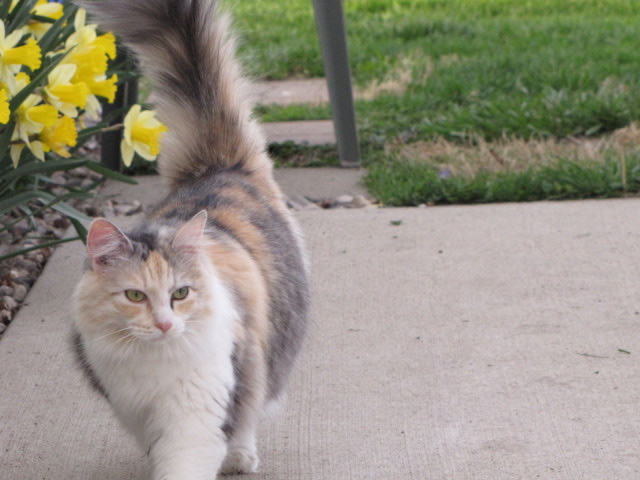 Breed
Question
Sammy Sammy
We found this cat out
Breed
Question
Sammy Sammy
We found this cat out
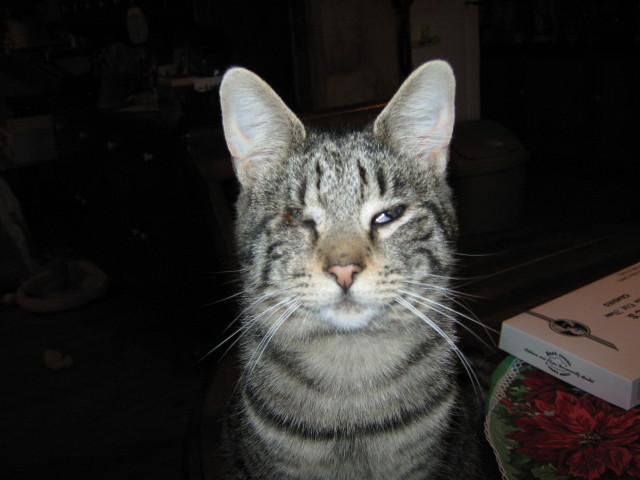 What breed is Jerome the Cat
Question
Jerome the Cat
Hi Karen.
Last summer on my da
What breed is Jerome the Cat
Question
Jerome the Cat
Hi Karen.
Last summer on my da
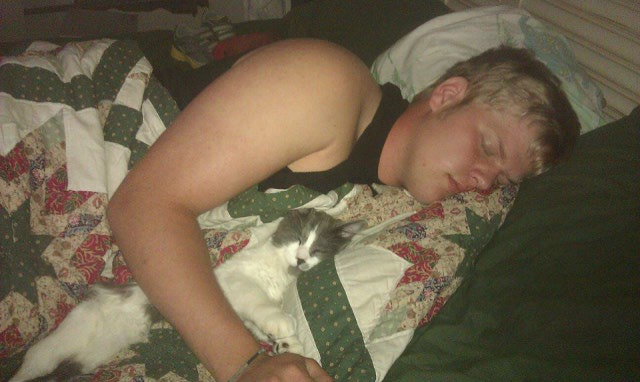 Sick kitty
Question
Kelso
Hi, I rescued a feral cat who was
Sick kitty
Question
Kelso
Hi, I rescued a feral cat who was
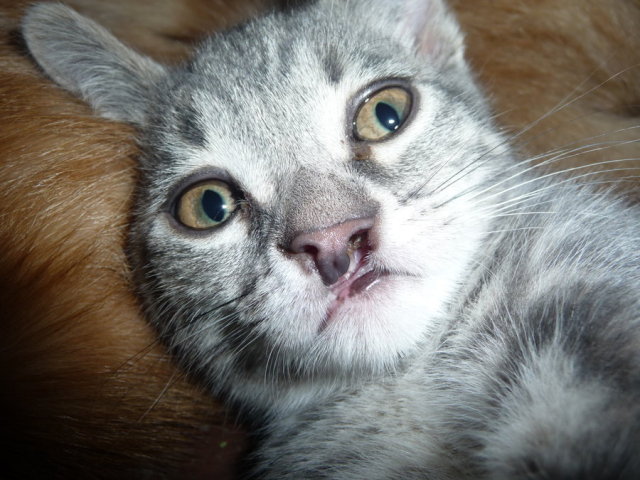 Cleft Lip
Question
Cleft Lip Kitty
Hi Ali,
I have a cat thats 11
Cleft Lip
Question
Cleft Lip Kitty
Hi Ali,
I have a cat thats 11
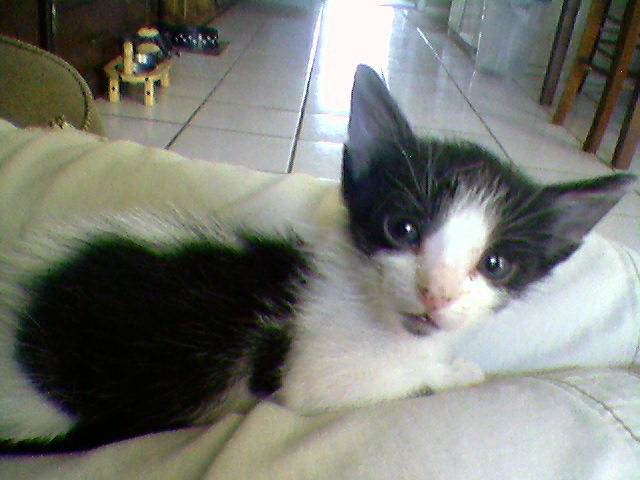 Orphan Kitten Care
Question
My new baby
Hello! Okay, Ill try to sho
Orphan Kitten Care
Question
My new baby
Hello! Okay, Ill try to sho